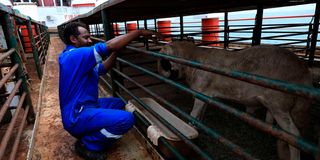Lamu port cattle exports to Middle East commence

An employee cleans a sheep inside MV Banyas 1 Lome Vessel at the Port of Lamu on October 15, 2022. The vessel will transport livestock for export to Oman.
Livestock exports through the Lamu port will commence next week, raising Kenya’s hopes of increasing its stake in the rapidly growing Middle East Market.
The shipments that begin on Tuesday will be a boost for the port whose viability had come under question. This opens a new income stream for pastoralists and ranchers hard hit by recurrent drought and diseases, especially in Northern Kenya where livestock keeping is the region’s economic mainstay.
Over 16,000 cattle, sheep and goats with good fat layout will be exported to Oman by the specially designed livestock transport vessel Mv Banyas 1 ship, which docked at the Lamu port on Friday. This is the first shipment of its kind in the Lamu port, which started operations in May 2021. Mv Banyas 1 is the thirteenth ship to call on the country’s second commercial port.
In January, Kenya resumed direct export of livestock to Oman’s Salalah Port after more than 16 years ban. Live animal exports in Kenya plummeted in the 90s.
In 2021, the Middle East countries of Kuwait and Bahrain lifted a ban on Kenya’s meat following the containment of the Rift Valley Fever disease that led to restrictions.
The Saudi Arabia government also issued new requirements for Kenya’s meat exports.
Following the strict requirements placed on Kenya for export of livestock, the government is harnessing viable expertise to streamline proficiency in handling of the cows, sheep and goats.
Importers will normally specify the characteristics of the goats they want depending on the market demand. In most cases, the goats are classified by breed, age and weight. All must be in good body condition to give quality meat.
“The animals have been subjected to strict inspection by veterinary officers to ensure they are healthy and disease-free. This also ensures the conditions outlined by the country of destination have been met,” said Mr Wilson Gwiyo from Kenya Ports Authority (KPA) cargo services.
Already, a marshalling yard has been put up at the Lamu port and plans are on course to invest in animal laboratories. Also ongoing is the construction of standard disease-control veterinary fences, livestock holding pens with associated gates, livestock housing and feeding troughs equipment.
The yard is part of the Sh3 billion Bar’goni Livestock Pre-Export Quarantine project aimed at boosting the export of live animals. Al-Bashayer Meat Company, an Oman State Company has chosen the Port of Lamu for importation of livestock from the region on atleast two shipments per month.
To realise the business, the company has leased MV Banyas 1 and 100 acres at Mokowe area which it started developing as a livestock area under the supervision of the State Department of Veterinary Services.
Expected shipment per each call is 16,000 livestock of sheep, goats and cattle. Al Bashayer Trade manager Jack Kisero said there is more value for livestock farmers when animals are exported alive than when dealing with beef.
Tuesday will be the third lot the firm will be shipping to Oman after exporting two times at the Mombasa port.
Mr Kisero said the export quota will be increased depending on the level of demand but he projected they will be able to export at least two consignments every month in the coming months.
“We have capacity to grow our meat export market through resolving supply issues like delivery logistics. For live exports to Oman, it will take a week. This is our first rotation in Lamu and using this compared to Mombasa port, we save 36 hours which also cuts costs on animals and improves on animal welfare because the faster they get to the destination, the better,” he said.
He said a multi-agency team has been brought on board to assess livestock quality control systems in a move aimed at unlocking the sector’s export potential.
This is because Kenya’s livestock remain banned in some export markets including parts of the Arab world due to failure to meet the international food safety standards.
Animals must also be confirmed to be free of both external and internal parasites such as ticks, mites, lice and worms.
“The inspection and verification by this team will open some of the best markets in the Arab countries which we currently have no access to,” said Kisero.





